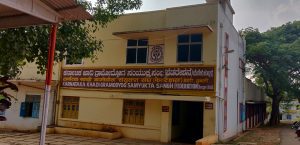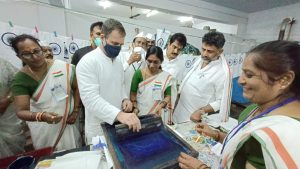The Flag Code of India was amended on 30 December, 2021, allowing the manufacture and use of polyester and machine-made flags.

Making the national flag involves hard: Cutting, curing, stitching, bleaching, dyeing, printing, toggling, ironing. (Supplied)
The Modi government’s “Har Ghar Tiranga” campaign encouraging citizens to hoist the national flag should have been welcomed by the country’s only licensed manufacturer of khadi Tricolour.
Only, it has not.
The Karnataka Khadi Gramodyoga Samyukta Sangha (KKGSS), the license holder, is unmoved by the campaign that, according to his critics, forms a part of the Modi government’s plans to extract the maximum mileage out of India’s 75th year of her Independence.
If anything, a pall of gloom hangs over the nearly 45,000 families directly and indirectly associated with the KKGSS. The Sangha directly employees 1,200 people, about 1,000 of them women. Yarn suppliers, weavers, distributors of finished flags and those involved in its sale are indirect beneficiaries.
The reason: The Centre’s decision to amend the Flag Code of India and allow the manufacture or import of machine-made national flags made of polyester. The move threatens to snatch away the meagre Rs 5,000-6,000 the women at Khadi Sangha earn in a month from stitching our national flag.
They have been thus employed for decades. Polyester flags could render them jobless in a few months.
The signs are already visible, says the Khadi Sangha.
In the seven months since the revised Flag Code of India was announced last December, the KKGSS has seen sales of khadi flags dropping at an alarming rate, its secretary Shivanand Mathapathi told South First.

Karnataka Khadi Gramodyoga Samyukta Sangha came into existence at Bengeri on 1 November, 1957. (Supplied) (Supplied)
“In 2018, we earned about ₹3.5 crore. This year, we have earned about ₹60 lakh till July. Orders for factory-made polyester flags are the reason behind the drop in sales.”
According to Shivanand, the government decision to amend the Flag Code has not only “devalued khadi” but would also affect the thousands involved with khadi centres across the country.
“The demand for polyester flags will rise in the coming years, cripple production of the khadi flags, and lead to mass unemployment,” he says.
“It seems the Modi government is doing away with its own slogan of ‘Atmanirbhar Bharat’.”
Khadi Sangha was registered under Section 21 of the Societies Registration Act 1860 in 1957, and set up in the Bengeri area of Hubballi on 17 acres. The initial workforce of 2,000 came down to 1,500 by 2010, and finally to 1,200 currently.
A subsidiary of the Khadi Sangha was established in Bagalkot in 1973, a little over a 100 km away, with 22 sub-units to make clothes and household items like bedsheets out of khadi.
But an overall dip in demand over the past few years has led to two sub-units closing down in 2015.
Falling demand for khadi products has hit KKGSS’ overall earnings as well. In its heydays, sales had peaked at ₹4.5 crore in 2007. The turnover of in FY2021-22 was the lowest in its history at ₹78 lakh.
The 1,200 workers at Khadi Gramodyoga’s Hubballi facility, make the national flags manually, which involves cutting, curing, stitching, bleaching, dyeing, printing, toggling and ironing.
The job may seem humble to many, but it was secure and ensured steady earnings for the workers. For instance, Annapurna H. Doddamani started work as a stitcher, but rose steadily over the years to her current position of manager.

Congress leader Rahul Gandhi at the Tricolour manufacturing unit of the Khadi Gramodyoga Samyukta Sangha at Hubballi-Dharwad. (Supplied)
But ever since the Flag Code amendment that triggered a fall in sales, all she feels is a great sense of insecurity in her job.
“In the 75th year of Independence, the government is doing away with Gandhiji’s principle of promoting khadi,” she quips wryly to South First.
The workers, many of who have been employed at Hubbali for nearly two decades, are paid on the basis of the number of flags they make. On an average, each worker makes around ₹5,000 a month. But even this meagre amount is now threatened.
“They could be jobless because of the amendment,” says Doddamani.
Like Nirmala, who has been printing the “Ashoka Chakra” on the national flag for 18 years. “We believed this being the 75th year of Independence, our income would be high. But the government has ruined everything.”
Echoes Riyana Ballaria, a stitcher for the past 12 years: “The polyester flags have crippled us.”

May 02, 2024

May 02, 2024

May 02, 2024

May 02, 2024

May 02, 2024

May 02, 2024